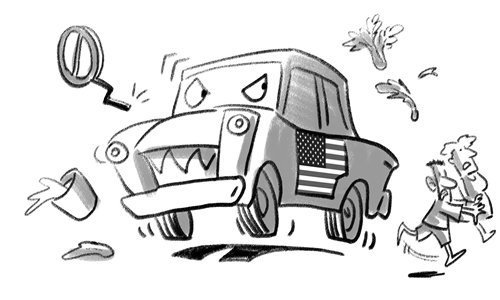Trump’s unilateralism driven by US hegemony

Illustration: Liu Rui/GT
Power is corrosive, and hegemonic power more so. Unilateralism is an example of the corrosion of power. The unilateralism in trade being exercised by the US is in essence a result of the habitual exploitation of power.
The political, security, economic, financial and trading systems that the US strived to establish after World War II indeed laid a progressive and balanced foundation for global development. But in the meantime, Washington gained immense hegemonic benefits.
Nonetheless, in the process of globalization, power can trigger problems in three ways. First, power breeds capricious hegemony. A hegemonic power, in the habit of naturally strengthening its grip, will always seek more interests.
When the hegemonic power is challenged, it is difficult for it to step back by force of habit. The more it is pressed to withdraw, the more it will resist. For now, a hegemonic power like the US has come to the opposite end of the trading system it established.
Second, the hegemonic power of the US, based on a certain system, is different from any such previous power. A hegemonic power and a system are interdependent. When the system changes, the basis of the hegemonic power will change.
To a large extent, the gains that the US has made have resulted from it being the main force of sustaining the whole system. Other countries, especially its allies, can live in stability brought about by this system.
These allies are obliged to follow the US, especially when it feels uncomfortable; they have to soothe its feelings and compromise their interests for the sake of the US. At such a time, maintaining US interests may be akin to maintaining a kind of order.
For instance, the US signed the Plaza Accord with Japan, France, the UK and West Germany on September 22, 1985, aiming at intervening in currency markets, to arrest depreciation of the US dollar in relation to the Japanese yen and German Mark so as to reduce the US current account deficit. As a result, the yen appreciated swiftly. Since then, the Japanese economy fell into a depression, followed by a bubble crisis and eventually a bust. The economy has not recovered its vitality for over 20 years.
Third, maintaining hegemony also needs strength. The strength of a country can be measured only relative to other powers. The decline of hegemony is often connected with a decrease in strength. Paul Michael Kennedy, a British historian, once said that "those who do not advance, go backwards and who goes back goes under."
According to Kennedy, the strength of a great power refers to the relationship among defense expenditure and security, society and consumers' needs as well as increased investment. These three aspects can create tensions in the fight for natural resources. The best way is to keep the three aspects in balance. A major power cannot maintain its standing if it fails to strike a balance between defense, investment and consumption.
The trade war launched by Trump mirrors the triple tensions the US is facing. Today's US is at the crossroads of such a choice. But the way it behaves is still influenced by its hegemonic instinct, leading to the world witnessing many decisions which seem to be irrational.
The author is a senior editor with the People's Daily, and currently a senior fellow with the Chongyang Institute for Financial Studies at Renmin University of China. dinggang@globaltimes.com.cn. Follow him on Twitter @dinggangchina

